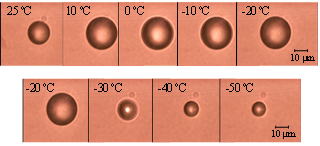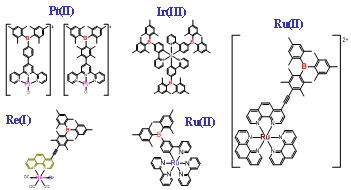|
Analytical Chemistry Laboratory focuses on the research subjects related
to “photon” on the basis of various photochemical/photophysical techniques
represented by laser spectroscopy and microanalytical (absorption, emission,
Raman, and electrochemistry) techniques as well as by an optical trapping
technique for single microparticles. Main topics of the research are as
follows.

We are studying optical trapping – microspectroscopy of single microparticles
in solution (i.e., colloidal particles) as well as in air (i.e., aerosol
particles). Colloidal microparticles can be freely manipulated by a focused
laser beam and individual particles can be analyzed by microanalytical
techniques developed in our research group: absorption, emission, Raman,
and/or electrochemistry. The particular techniques have been successfully
applied to reveal the dynamics of the ion-exchange processes in single
microparticles and the mass transfer dynamics at single picoliter oil-droplets/water
interface as well as to demonstrate the freezing processes of single super-cooled
water droplets in air.
|
 |
 |
Optical trapping – microspectroscopy
system. |
Optical trapping of a single aerosol water-droplet in air and experimental demonstration of formation of a super-cooled water droplet at –50 ºC.
|
English
English
English |

We are now focusing our study on the photophysical properties of triarylborane
derivatives as well as transition metal complxes having a triarylborane
unit(s) at the periphery of a π-chromophoric ligand(s). Triarylborane derivatives
show very characteristic excited state and an excited electron of the derivative
sit more or less on the vacant p-orbital on the boron atom, resulting in
sometimes large solvatochromic fluorescence shift. Transition metal complexes
having a triarylborane unit(s) also exhibit unique spectroscopic, photophysical,
and electrochemical characteristics.
|
 |
 |
| Fluorescence solvatochromic shift of tris{[p-(N,N-dimethylamino)phenylethynyl]duryl}borane. |
Transition metal complexes having a triarylborane unit(s) developed in
our research group. |
|




